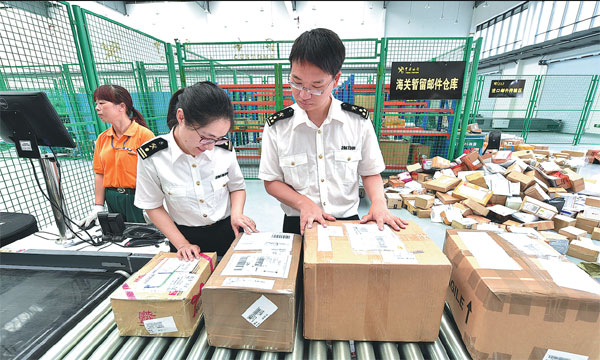Sector of cross-border e-commerce booming
Government measures to facilitate trade have paved the way for rapid business development
Chinese companies specializing in cross-border e-commerce are an enthused lot these days.
Government measures to facilitate trade have helped them in several ways, including logistics, customs and cross-border payments.
All this will pave the way for rapid development of the sector, they say.
|
Customs officials in Yiwu, Zhejiang province, inspect e-commerce parcels from South Korea. Lyv Bin / For China Daily |
"Cross-border e-commerce has effectively broadened the channels for enterprises seeking to enter the international market using internet and information technology, becoming an important technical foundation to promote economic integration and the globalization of trade," says Diane Wang, founder and CEO of DHgate, a cross-border business-to-business e-commerce platform.
Wang says facilitation measures can simplify logistics, customs and cross-border payments related to trade, making regulation more transparent and efficient. "The level of trade facilitation will determine the development of cross-border e-commerce."
DHgate connects China-based small and medium-sized enterprises with buyers worldwide, providing a safer and efficient online marketplace.
It serves 10 million registered buyers from more than 230 countries and regions by connecting them to over 1.4 million Chinese suppliers from across China.
It has established two platforms to help Chinese SMEs go overseas. The first is a trading platform where Chinese enterprises can get overseas orders continuously and close deals.
The second is an integrated platform for international trade where services like online payments, logistics, storage, supply-chain finance, customs clearance and tax refunds will be offered.
"The facilitation of trade can greatly shorten the cycle from the signing (of orders) to the completion of the (goods) delivery, promoting trade growth, the flow of funds and product updates," Wang says.
According to DHgate, since 2013, China has become the largest e-commerce market in the world. Since 2016, China has also become the second-largest digital economy in the world.
The digital economy contributed over 30 percent of China's GDP, which was 74.4 trillion yuan ($11.3 trillion; 9.6 trillion yuan; £8.6 trillion) in 2016. This number is expected to be over 35 percent by 2020.
Statistics from iResearch Consulting Group show that China boasts 16.4 trillion yuan in annual digital turnover, with consumer online shopping alone reaching 3.8 trillion yuan last year.
The Shanghai-based cross-border e-commerce site Ymatou.com is also benefiting from the facilitation of trade and the Belt and Road Initiative.
Zeng Bibo, chief executive officer of Ymatou, says, "Trade barriers among countries will be further reduced while corresponding policies and measures are becoming more convenient, which will also bring about a more stable and positive atmosphere and environment for enterprises' expansion and capital deployment across various countries."
Zeng says the Belt and Road Initiative could speed up a series of processes in cross-border trade, including fund settlement and logistics, as well as promote the construction of infrastructure and ecological environment in related industries.
Ymatou will continue to improve its logistics. "We'll mainly focus on the evaluation and operation of railway channels between China and Europe, and therefore improve the supply-chain efficiency for European large commodities to enter the Chinese consumer market," says Zeng. China will set up more cross-border e-commerce pilot zones to facilitate trade and boost China's global competitiveness.
The government says it will further streamline administration, enhance compliance oversight and improve service as well as the policy matrix for cross-border e-commerce, to boost efficiency and reduce costs of doing business.
Statistics from the Ministry of Commerce show that 220 countries and regions were covered by China's cross-border e-commerce network as of 2016, with a turnover of 5.85 trillion yuan, up by 28.2 percent year-on-year.
Li Jiayue contributed to this story.
fanfeifei@chinadaily.com.cn



















